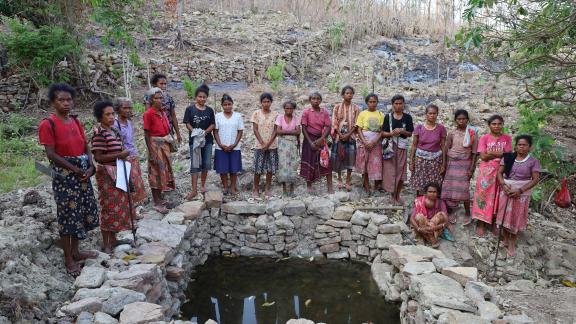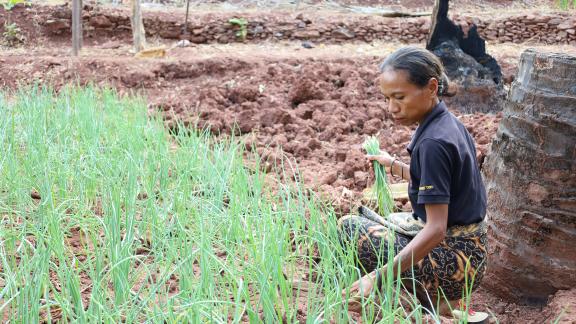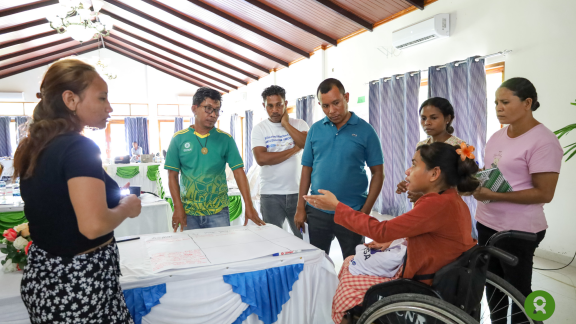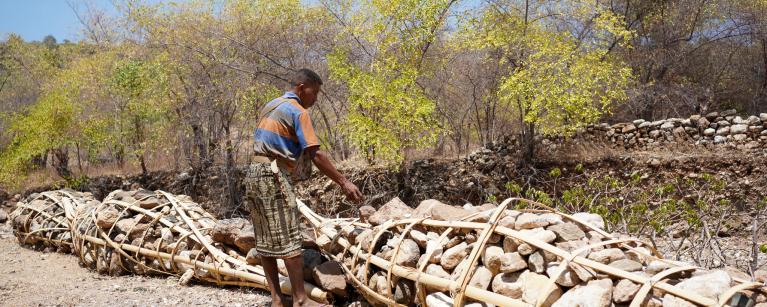When I think about change, I picture people coming together, not waiting for solutions to be handed down. In Timor-Leste, a small nation rebuilding after years of struggle, community-led development is proving that real progress starts from the ground up. Oxfam’s work in Timor-Leste shows how empowering local voices can tackle inequality and disasters, offering lessons for the world.
Timor-Leste faces tough challenges. Nearly 70% of its people live in rural areas, relying on small-scale farming. Poverty is widespread, and climate change brings droughts, floods, and landslides that hit the poorest hardest. Women and people with disabilities often face exclusion, with limited access to land, education, or decision-making. Yet, Oxfam’s approach, rooted in localization, is showing how communities can lead their own way forward.
Localization means trusting local people to drive change. Instead of outsiders imposing plans, Oxfam partners with local organizations like Rede ba Rai (Land Network) to strengthen women’s land rights. Women, who often farm but don’t own land, are now gaining a voice in decisions, challenging deep-rooted inequalities. I’m inspired by stories like Josefa’s, who, through Oxfam’s Savings for Change groups, learned to save, invest, and advocate for herself. These groups don’t just build wallets; they build confidence and community.
Disasters are another test. Timor-Leste is the seventh most disaster-prone country globally, and climate change makes it worse. Oxfam collaborates with local partners to create village-level disaster plans. In one village, the Suco Disaster Management Committee, supported by Oxfam, mapped flood risks and trained locals to respond. When floods hit, the community didn’t wait—they acted, saving lives and homes. This shows what happens when people aren’t just recipients of aid but leaders in their own resilience.

Timor-Leste’s upcoming ASEAN (The Association of Southeast Asian Nations) membership, set for October 2025, amplifies this approach. Joining ASEAN opens doors to regional cooperation, including climate finance through initiatives like the Green Climate Fund. In 2019, Timor-Leste secured $22 million to build climate-resilient infrastructure, showing how global partnerships can support local action. By aligning with ASEAN’s focus on sustainability, communities can access resources to strengthen climate justice, ensuring funds reach those most affected by environmental challenges, like farmers and coastal villages facing rising seas.
Why does this work? First, local people know their needs best. They understand their land, culture, and challenges in ways outsiders can’t. Oxfam’s role is to amplify these voices, not replace them. Second, community-led projects last. When locals own the process, they’re invested in keeping it going. In Timor-Leste, Oxfam’s work with disability groups ensures that people with disabilities help shape budgets and policies. This isn’t charity—it’s justice, giving everyone a seat at the table.
There’s a personal side to this. Growing up, I saw how top-down solutions often missed the mark in my own community. A shiny new project would arrive, but without local input, it fizzled out. Timor-Leste’s story reminds me that change sticks when it’s built by those it serves. Oxfam’s approach isn’t perfect, but it’s a model of humility—stepping back to let communities’ lead.
This matters beyond Timor-Leste. Inequality and disasters are global problems. In 2024, billionaire wealth grew by $2 trillion, while millions struggle. Community-led development offers a path to balance this. It’s not about giving up expertise but about blending it with local wisdom. Donors and governments must shift, funding local groups directly and trusting their priorities. This means flexible funding, not rigid plans, and listening, not dictating. With ASEAN’s support, Timor-Leste can lead on climate justice, ensuring communities have the resources to adapt and thrive.
Timor-Leste’s lessons are clear: empower communities, and they’ll build a future that works for everyone. Oxfam’s partnerships show that when people lead, they don’t just survive—they thrive. Let’s take this model global, supporting local leaders to tackle inequality and disasters head-on. The world doesn’t need more saviours; it needs more listeners.
The author is the Country Director of Oxfam in Timor-Leste and can be contacted on pankaja@oxfam.org.au
******
Tansá Dezenvolvimentu Ne’ebe Lidera hosi Komunidade Funsiona Liu: Lisaun sira hosi Oxfam iha Timor-Leste

Bainhira ha'u hanoin kona-ba mudansa, ha'u imajina ema sira ba hamutuk halibur malu, la hein atu solusaun sira mosu mai de’it. Iha Timor-Leste, nasaun ki’ik ne’ebé harii hikas hafoin luta tinan barak, dezenvolvimentu ne’ebé lidera husi komunidade prova katak progresu loloos hahú husi baze. Oxfam nia serbisu iha Timor-Leste hatudu katak bainhira ita fó kbiit ba lian lokál, sira bele luta hasoru dezigualdade no dezastre sira, ne’e hanesan lisaun ida ba mundu tomak.
Timor-Leste hasoru dezafiu barak ona. Kuaze 70% hosi Timor-Leste nia populasaun moris iha área rurál sira, depende ba agrikultura ho eskala ki'ik. Pobreza ne’ebe jeneralizadu, no mudansa klimátika halo rai-maran, lori inundasaun, no rai-halai ne'ebé afeta maka'as liu ema kbiit la’ek sira. Dala barak feto no ema ho defisinsia hasoru eskluzaun, ho asesu limitadu ba rai, edukasaun, ka foti desizaun sira. Maibé, Oxfam nia aprosimasaun, ne'ebé maka hare liu ba iha lokalizasaun, hatudu oinsá komunidade sira bele lidera sira nia dalan rasik ba oin.
Lokalizasaun signifika fiar komunidade lokál sira atu lori mudansa. Envezde ema li’ur mak impoin planu, Oxfam halo parseria ho organizasaun lokál sira hanesan Rede ba Rai hodi hametin feto sira-nia direitu ba rai. Feto sira, ne'ebé dala barak halo to'os maibé laiha rai, agora bele hato’o sira lian iha desizaun sira, hodi dezafia dezigualdade sira ne'ebé iha. Ha'u hetan inspirasaun hosi istória sira hanesan Josefa nian, ne'ebé, liuhosi grupu sira Oxfam nian Rai-Osan ba Mudansa (ROMANSA), aprende atu poupa, investe, no advokasia ba nia aan rasik. Grupu sira-ne'e la'ós de'it atu buka no rai osan ba sira nia uma-laran; sira hadi’ak sira nia komunidade no hasa’e konfidensia komunidade nian.
Dezastre sira hanesan teste ida. Timor-Leste nu’udar nasaun sétimu ne’ebé iha tendénsia ba dezastre iha nível mundiál, no mudansa klimátika halo ida-ne’e sai grave liután. Oxfam kolabora ho parseiru lokál sira hodi kria planu dezastre sira iha nivel suku nian. Iha suku ida, Komité Jestaun Dezastre Suku nian, ne’ebé hetan apoiu husi Oxfam, halo mapa ba risku inundasaun no fó treinu ba komunidade sira atu responde. Bainhira inundasaun sira akontese, komunidade la hein—sira atua, salva moris no sasan sira. Ida-ne'e hatudu katak saida mak sei akontese bainhira komunidade sira la'ós de'it simu ajuda maibé lídera rasik sira nia aan ba sira nia reziliénsia rasik.

Timor-Leste nia adezaun ba ASEAN (Asosiasaun Nasaun sira Sudeste Aziátiku nian) ne'ebé sei akontese iha tempu badak, iha Outubru 2025, amplifika aprosimasaun ida-ne'e. Tama ba ASEAN loke odamatan ba kooperasaun rejionál sira, inklui finansiamentu klimátiku liuhosi inisiativa sira hanesan Fundu Klima Verde. Iha tinan 2019, Timor-Leste hetan millaun $22 hodi harii infraestrutura ne’ebé reziliente ba klima, ida ne’e hatudu oinsá parseria globál sira bele apoia asaun lokál. Bainhira ita aliña ho ASEAN nia objetivu ne’ebe foka ba sustentabilidade, komunidade sira bele asesu ba rekursu sira hodi hametin justisa klimátika, hodi asegura fundu sira to'o ba sira ne'ebé afetadu liu hosi problema ambientál sira, hanesan agrikultór sira no komunidade sira ne’ebe hela besik área kostál tasi-ibun nian ne'ebé mos afetadu husi nivel tasi ne'ebé sa'e makas.
Tanba saida maka ida-ne'e funsiona? Dahuluk, komunidade lokál sira hatene sira nia nesesidade di'ak liu. Sira komprende sira nia rai, kultura, no dezafiu sira iha maneira ne'ebé ema liur la hatene. Oxfam nia papél maka atu habelar lian sira-ne'e, la'ós atu troka. Daruak, projetu sira ne'ebé lidera hosi komunidade dura liu. Bainhira komunidade lokál sira mak sai na'in ba prosesu, sira sei investe aan atu mantein prosesu ne'e kontinua. Iha Timor-Leste, Oxfam nia serbisu ho grupu ema ho defisiénsia sira garante katak ema ho defisiénsia sira hola parte iha foti desizaun ba orsamentu no polítika sira. Ida-ne'e la'ós karidade—maibe ida ne'e justisa, fó fatin ba ema hotu iha meza hodi hato’o sira nia lian.
Iha parte pesoál ida ba ida-ne'e. Bainhira ha’u hanesan foinsa’e ida, iha tempu ne’eba ha'u haree oinsá solusaun sira ne’ebe hato’o hosi leten ba kraik dala-barak iha ha’u nia komunidade rasik la hetan prezensa. Projetu foun ida ne'ebé di’ak sei to'o, maibé la-hó komunidade lokál sira nia prezensa, hanoin no ideia, ida-ne'e ladi’ak. Timor-Leste nia istória fó hanoin mai ha’u katak mudansa sira sai metin liu bainhira harii hosi sira ne’ebé nia serbí. Oxfam nia aprosimasaun la perfeitu, maibé ida-ne'e maka modelu umilidade nian ida—atu hakat ba kotuk hodi husik komunidade sira lidera.
Problema hanesan ne’e la’os de’it akontese iha Timor-Leste. Dezigualdade no dezastre sira ne’e hanesan problema globál ida. Iha 2024, rikusoin bilionáriu nian aumenta ba biliaun $2, enkuantu ema millaun iha mundu mak sofre. Dezenvolvimentu ne'ebé lidera hosi komunidade sai hanesan dalan ida atu halo balansu ba ida-ne'e. Ida ne’e la'ós katak ita la uza ona ita-nia matenek sira, maibé ita hakarak kahur ho matenek lokál. Doadór sira no governu sira tenke muda modelu fundu nian hodi finansia grupu lokál sira diretamente no fiar sira nia prioridade sira. Ida-ne'e signifika finansiamentu fleksivel, la'ós planu sira ne'ebé metin, no rona komunidade sira nia lian, la'ós atu dita fali. Ho ASEAN nia apoiu, Timor-Leste bele lidera iha justisa klimátika, asegura komunidade sira iha rekursu atu adapta no buras.
Timor-Leste nia lisaun sira klaru: fó kbiit ba komunidade sira, no sira sei harii futuru ida ne'ebé funsiona ba ema hotu. Oxfam nia parseria sira hatudu katak bainhira komunidade sira lidera, sira la'ós de'it sobrevive—sira buras. Mai ita foti modelu ida-ne'e hodi lori ba mundu globál, hodi apoia líder lokál sira atu hasoru dezigualdade no dezastre sira. Mundu la presiza tan salvadór sira; ita presiza mak ema hodi rona.
Hakerek nain: Diretor País Oxfam iha Timor-Leste no bele kontaktu iha pankaja@oxfam.org.au
